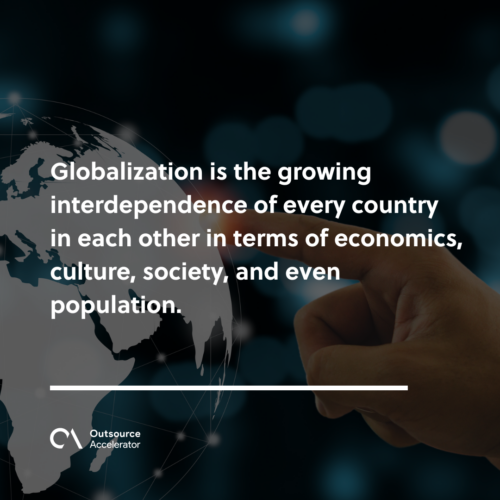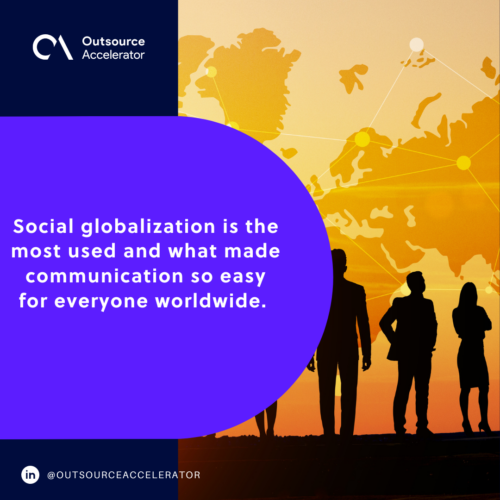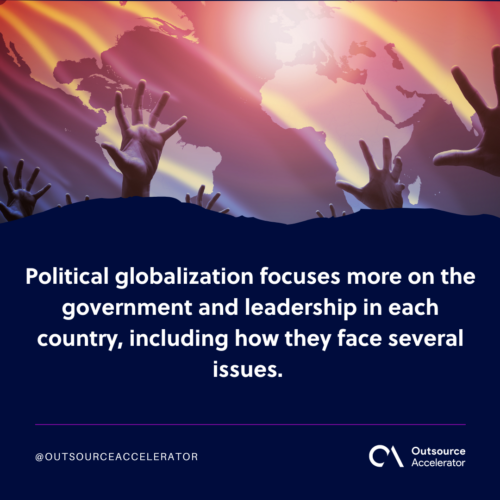What is globalization?

Globalization is the growing interdependence of every country in each other in terms of economics, culture, society, and even population.
It highlights the relationship in the world in terms of exchanging information, trading, and other aspects.

More so, globalization makes the world feel that the distance between them should not be a hindrance to continuing to be connected.
Different definitions of globalization by the experts
There are various meanings and perceptions of globalization for different experts and authors worldwide.
One of those is Anthony Giddens, a sociologist. He defines globalization as “the intensification of social relations all over the world.”
For sociologist and theorist Roland Robertson, globalization refers both to the compression and intensification of the world’s consciousness as a whole.
What are the types of globalization?
There are five main different types of globalization considered as the most common processes people do that define globalization, those types are:
Economic globalization
Globalization has undeniable economic benefits, which is why it is the most common and known type of globalization.
It has the most impactful and most felt process in the world as it relates to each country’s relationship in terms of exporting and importing its own products to sell and buy, which helps to raise its state.
Organizations like the World Trade Organization and the United Nations play pivotal roles in shaping and regulating international trade agreements and economic policies to facilitate smooth global transactions and cooperation.
Social globalization
Social globalization is the most used and what made communication so easy for everyone worldwide.
This is the type of globalization wherein the exchange of information and sharing of ideas happens.
Another pivotal aspect is the global supply chain, which facilitates the movement of goods and services across borders and enhances business efficiency and productivity.
Multinational corporations play a key role in globalization by expanding operations beyond national boundaries and influencing economies and policies on a global scale.
Global markets provide opportunities for trade and investment, promoting economic growth and interdependence among nations.
Global supply chain disruptions pose challenges, with recent disruptions affecting industries worldwide and showing the vulnerability of interconnected supply chains to external shocks.

It helps people be aware of what’s happening not just around and within their own country but around the world.
Cultural globalization
Cultural globalization refers to the type of globalization in which everyone shares their traditions and how they live their everyday lives based on their hometown or home country.
Cultural globalization is about the transmission of meanings and values that help extend and intensify social relations.
In the context of developing countries, globalization plays a pivotal role in shaping national economies by facilitating trade, investment, and technological advancements.
This integration into the global economy can lead to enhanced economic growth opportunities, enabling developing nations to participate in international markets and contribute to the global economy.
Political globalization
Political globalization focuses more on the government and leadership in each country, including how they face several issues. This helps the countries’ leaders to decide on who and which alliances they will belong to strengthen and expand their political ties.
The World Bank is instrumental in promoting collaboration and advancement among nations through its policies and programs within this framework.
Global business operations are also influenced by political globalization, as governments and international regulations impact trade and investments.
Those in favor of globalization argue that it fosters global integration, leading to enhanced communication, economic growth, and cultural exchange among nations.

Environmental globalization
Environmental globalization aims to increase global uniformity and connectedness in regular environmental management practices.
International banking institutions must change policies to address environmental concerns, highlighting the increasing importance of sustainable development in the global financial system.
It deals with all the ways that countries can help the environment, which benefits everyone.
Examples for each type:
- Free Trade agreements are one of the top examples of economic globalization. They have formally discussed agreements covering rules about buying and selling goods between two or more countries.
- Social media is the perfect example of social globalization. It is the most modern way for people to exchange ideas and information about relevant and even irrelevant issues.
- Food trade is an example of cultural globalization. It’s like letting other ethnicities try other ethnic foods and letting them experience and savor how different or similar food cultures are.
- The United Nations is considered a classic example of political globalization. It regulates the concerns of global commons and gives limitations on sovereignty or a state’s rights.
- The International Tropical Timber Organization is an example of environmental globalization. It promotes and encourages each country to conserve tropical forest resources and their sustainable management, use, and trade.
The impact is particularly evident in global stock markets, where environmentally-conscious practices can sway investor sentiment and redefine market dynamics.
What are the positive and negative impacts of globalization?
Globalization has undeniably positive and negative impacts, considering that it greatly affects everyone worldwide.
Positive impacts
Education. With the easier and more accessible ways of exchanging information, the level of education in each country is continuously improving, and more people are becoming knowledgeable and aware of other issues everywhere.
Technology. Thanks to globalization, technological advancements have widened, making certain aspects such as communication easier than before.
Employment. Global employment creates endless opportunities for organizations and employees worldwide.
This will increase the chances of people landing jobs and the number of companies finding employees, whether locally or internationally.
Negative impacts
Terrorism The risk of terrorism is high as anyone might feel greedy and plan to sabotage a country’s globalization relationship with others.
Currency fluctuation. At the same time, the risk of experiencing currency fluctuation is most likely to happen due to the differences in currencies used by certain countries.
Price instability. Price instability is connected with the currency fluctuation that people of a certain country can experience.
When the currency they are using decreases in value, the product’s price might rise quickly.







 Independent
Independent




